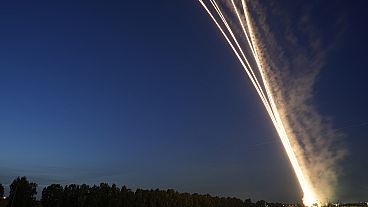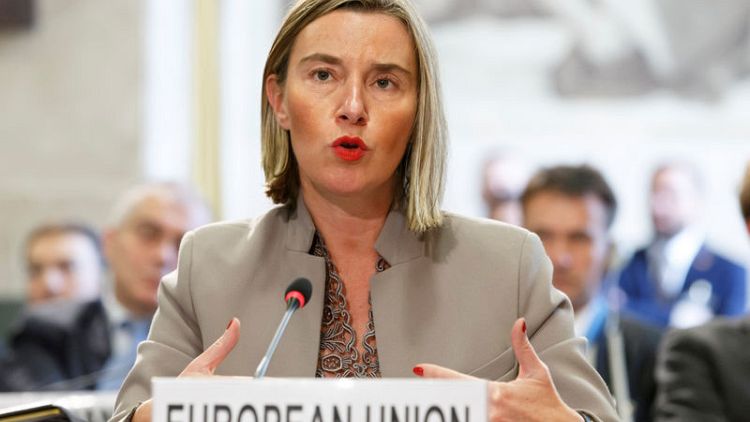By Gabriela Baczynska and Philip Blenkinsop
BRUSSELS (Reuters) - The European Union on Monday blacklisted nine people involved in rebel elections in east Ukraine last month but signalled no further punitive measures against Moscow over the latest flare-up of tensions with Kiev in the Azov Sea.
Instead, the EU's foreign ministers meeting in Brussels said they would look at offering more assistance to Ukraine, which had the Black Sea peninsula of Crimea annexed by Russia in 2014 and then saw Moscow back separatists in the industrial east.
The ministers discussed with Ukraine's Pavlo Klimkin "the latest developments in the Azov Sea but also, and mainly, the support of the European Union to Ukraine, to Ukrainian people, to territorial integrity of the country", said the bloc's top diplomat, Federica Mogherini.
The bloc on Monday adopted a decision to add nine people to its blacklist as a follow-up to the separatist vote in eastern Ukraine, diplomatic sources and officials said. Their names were to be released later.
Kiev has called for more Western sanctions against Moscow after Russian patrol boats fired at Ukrainian navy ships in the Azov Sea off Crimea. But the divided bloc is not going to act swiftly, if at all.
The 28 EU national leaders, who meet for a summit in Brussels on Thursday and Friday, are, however, due to decide to extend the bloc's existing sanctions that target Russia's defence, energy and banking sectors.
Germany's Haiko Maas said the situation in the Azov Sea remained unresolved as Russia was still holding the Ukrainian sailors. Berlin and Paris were seeking to ease tensions between Moscow and Kiev.
Fighting between Ukraine and Moscow-backed separatists in eastern Ukraine has killed more than 10,000 people since 2014 and small-scale but deadly exchanges of fire are still frequent.
Citing the Russian threat, Ukraine in November introduced martial law and banned Russian men of combat age from entering the country.
The EU has since released 500 million euros in financial assistance to Kiev but is split on whether to go ahead with any new economic sanctions, a move that would require unanimity of all 28 member states.
"We don't see yet any decision-making today on the table," Austria's Karin Kneissl said when asked whether the bloc would impose more sanctions over Russia following the sea incident.
On the other side of the spectrum is Lithuania, a leading EU hawk on Russia. Foreign Minister Linas Linkevicius said the Azov Sea standoff was a "blatant violation of international law" by Russia and could not be left unanswered.
"I don't expect something to be decided today but sanctions relating to this topic must be on the table," he told journalists.
(Reporting by Gabriela Baczynska, Philip Blenkinsop; Editing by Richard Balmforth)


